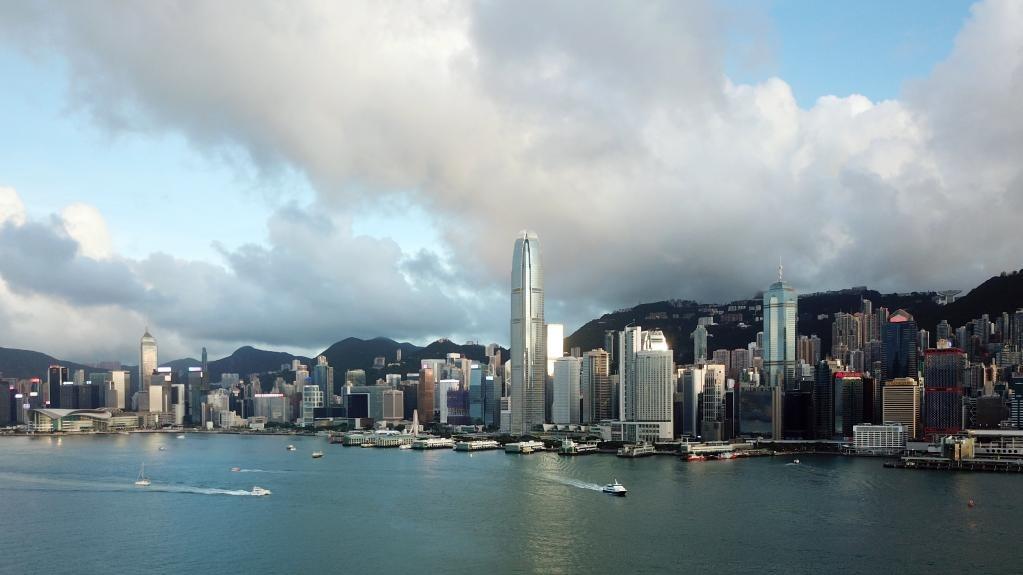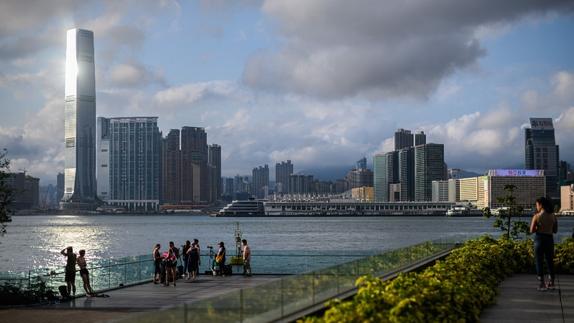 Aerial photo taken on May 29, 2022 shows a view of the Two International Finance Centre (IFC) in south China's Hong Kong. This year marks the 25th anniversary of Hong Kong's return to the motherland. (LI GANG/XINHUA)
Aerial photo taken on May 29, 2022 shows a view of the Two International Finance Centre (IFC) in south China's Hong Kong. This year marks the 25th anniversary of Hong Kong's return to the motherland. (LI GANG/XINHUA)
HONG KONG - As 2022 draws to a close, a blueprint caught the eyes of Lui Man-Sum, a youth in China's Hong Kong Special Administrative Region (HKSAR).
Lui found the Youth Development Blueprint, released on Dec 20, put forward concrete measures to address difficulties faced by Hong Kong youths in their education, employment, entrepreneurship, and home ownership.
"It gives me more confidence to face the challenges on my academic and entrepreneurial paths," Lui said, calling the government plan heartening for young people.
Jose Rodriguez, who oversees the Hong Kong business of a Boston-based greentech startup called Spare-it, also found Hong Kong's future encouraging.
The firm joined Hong Kong's Cyberport business park in October, selecting the city as a bridgehead for expanding its Asian market footprint.
ALSO READ: HK unveils blueprint to move full steam towards global I&T hub
"Hong Kong's plan for the smart city has brought us great business opportunities," he said.
To attract strategic enterprises, the HKSAR government has decided to establish the Office for Attracting Strategic Enterprises tasked with enticing enterprises, particularly those from industries of strategic importance, from around the globe to come to Hong Kong.
As a matter of fact, the sixth-term HKSAR government, inaugurated on July 1, has rolled out blueprints and concrete measures to make Hong Kong more competitive and meet the expectations of the general public.
By announcing the Primary Healthcare Blueprint, the new-term government formulates the direction of development and strategies for strengthening Hong Kong's primary healthcare system with a view to enhancing the overall health and quality of life of residents.
HKSAR Chief Executive John Lee announced in his first policy address in October the establishment of the chief executive's policy unit within this year to enhance capabilities in research and advocacy on long-term and strategic issues
"Over the past six months, the new-term HKSAR government has fully demonstrated a new atmosphere characterized by not avoiding difficulties and problems, daring to take charge, and being proactive and pragmatic on the ground," said Tam Yiu-chung, a member of the National People's Congress Standing Committee.
After taking office, the new-term HKSAR government promptly formulated five principles to combat the COVID-19 pandemic, including saying no to "lying flat", reducing serious illness and deaths, protecting high-risk groups, implementing tiered management and control, and balancing pandemic control with economic development.
The year 2022 marks the 25th anniversary of Hong Kong's return to the motherland. The next five years will be crucial for Hong Kong to break new ground and launch a new take-off, and the HKSAR government is seizing the opportunities of Hong Kong which is in a new stage of transition from chaos to order and to greater prosperity.
HKSAR Chief Executive John Lee announced in his first policy address in October the establishment of the chief executive's policy unit within this year to enhance capabilities in research and advocacy on long-term and strategic issues.
Lee on Dec 13 chaired the first meeting of the Steering Group on Integration into National Development, which focused on discussions of key and priority policies and initiatives for Hong Kong to dovetail with national strategies.
Cheung Chi-kong, executive director of the Hong Kong-based One Country Two Systems Research Institute, said the steering group is chaired by the chief executive, meaning that the new-term HKSAR government is dovetailing with national development strategies on the institutional level and stressing progress and effectiveness.
 People gather to watch the sunset as they stand on a viewing platform in Tamar Park overlooking Victoria Harbour and the Kowloon skyline in Hong Kong on May 5, 2020. (ANTHONY WALLACE / AFP)
People gather to watch the sunset as they stand on a viewing platform in Tamar Park overlooking Victoria Harbour and the Kowloon skyline in Hong Kong on May 5, 2020. (ANTHONY WALLACE / AFP)
Liang Haiming, chairman of China Silk Road iValley Research Institute, said, "In the past six months, Hong Kong has consolidated its traditional strength while further expanding new areas of development," adding that Hong Kong will certainly achieve an even greater and better development in the process of integrating into national development.
ALSO READ: HK highlights integrated support for youth in blueprint
The world has seen the tenacity of Hong Kong which is bouncing back and better than ever. Major international events were held in face-to-face sessions, including the Global Financial Leaders' Investment Summit, the biggest gathering of heavyweights in the financial hub in more than two years, and Hong Kong Sevens, a premier rugby tournament.
To compete for talents, the government policy address scrapped the annual quota for the Quality Migrant Admission Scheme in October. Liu Yan, a doctor from the mainland, immediately submitted her application after she learned about the good news.
"Hong Kong's medical system is aligned with international standards, and the city has universities strong in research," Liu said. "Coming to Hong Kong will make my career go further."
In the past half year, HKSAR government officials have also been busy reaching out to the world.
ALSO READ: HKSAR govt unveils 'Primary Healthcare Blueprint'
Paul Chan, financial secretary of the HKSAR government, visited the Middle East and hosted the Global Financial Leaders' Investment Summit with a tight schedule.
"We will take more initiatives to travel around the world to tell the stories of Hong Kong well and actively seek opportunities for cooperation, investment and development," Chan said.



